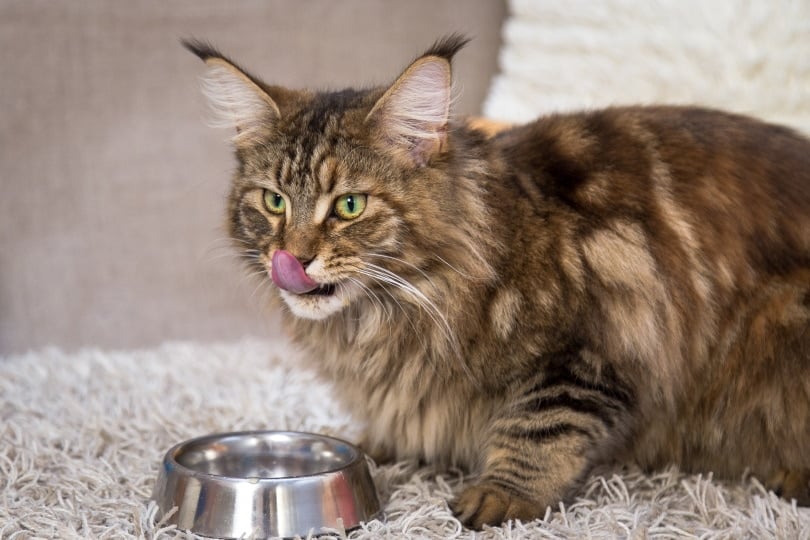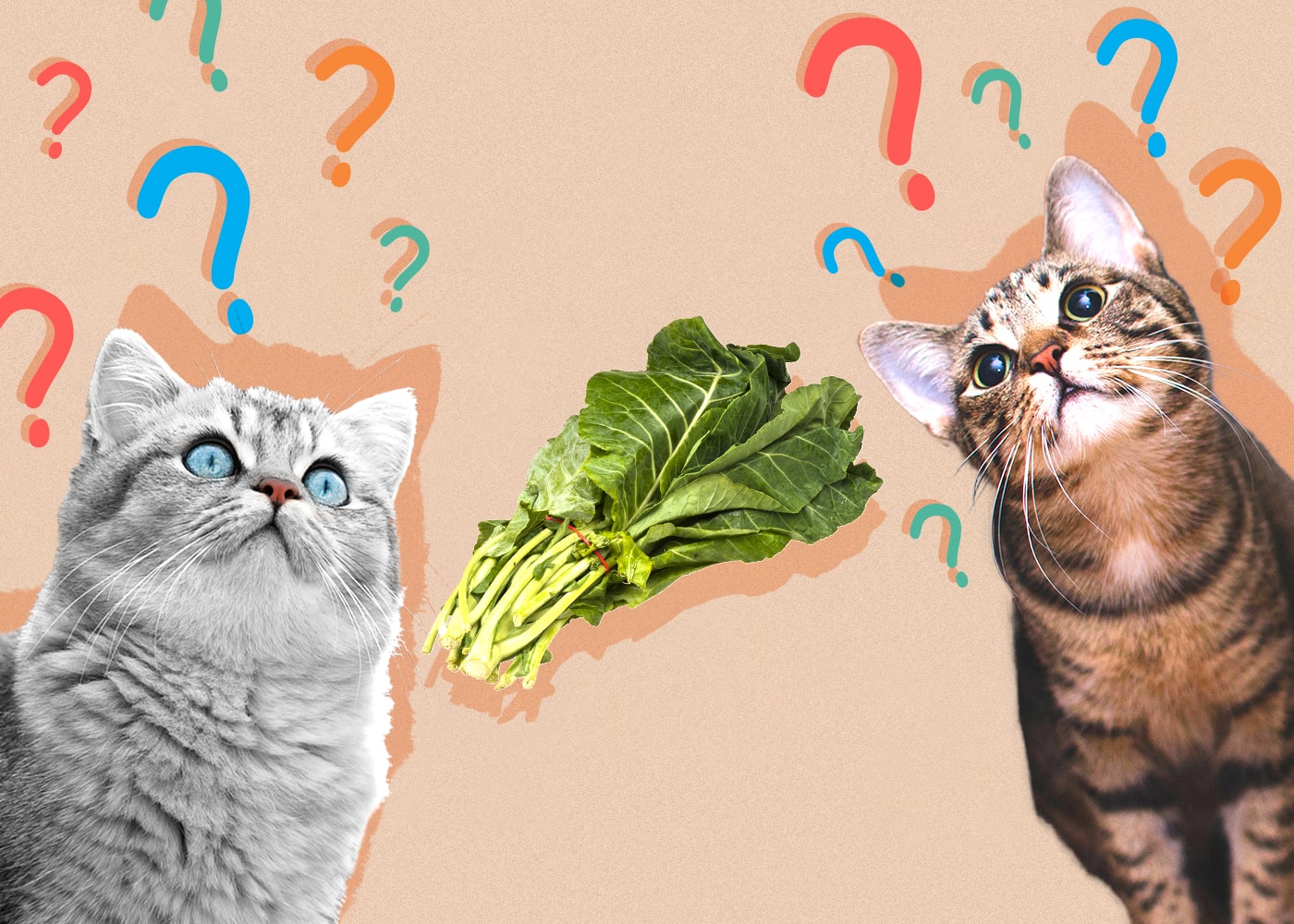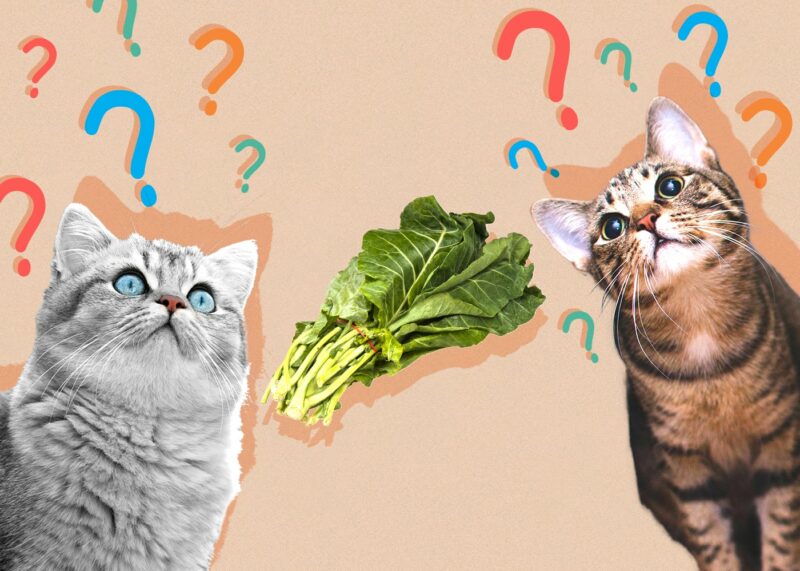Plain collard greens are perfectly fine for cats to eat. They provide a good source of fiber, as well as some nutrients and minerals. Cats cannot digest these greens quite as well as humans or dogs can, though, so they mostly act as a source of fiber.
Preferably, the leaves should be fresh and green. Raw collard greens are okay for your feline to eat, but most prefer them cooked. Furthermore, cooking the veggies makes them easier to break down, providing more nutrients for your cat.
However, cats cannot have seasoned collard greens. If you’ve made collard greens for yourself and have some leftover, there is a good possibility that they are not safe for your feline. Collard greens get seasoned with all sorts of different substances, and many of them are not safe for cats.
For instance, both garlic and onion are toxic to cats in high amounts. Cats are very small, so they do not need a lot for it to build up in their system. Furthermore, even added salt can cause problems due to their smaller size. While the salt we add to collard greens is not a problem for us, it can be a lot in terms of our cat’s diet. Therefore, it is best to avoid giving them collard greens that were made for human consumption unless you cook them completely plain and season them afterward.
For this reason, collard greens from restaurants are usually not a good option. When using canned and prepackaged greens, be sure to read the ingredient list. Many have seasonings and salt already added, which may make them inappropriate for cats.

Are Collard Greens Safe for Cats?
Collard greens themselves are completely safe for cats. If your feline nibbles on some fresh collard greens, there is no reason to rush them off to the vet. In fact, they can provide fiber and other nutrients, though they are rarely used in cat food.
The problem typically arises with the way that collard greens are prepared. In many cases, collard greens are heavily seasoned when they are cooked, though the exact seasonings used do vary. Some of these seasonings are not great for your cat and can cause significant problems. Therefore, it is best to not feed your cat collard greens that were seasoned for human consumption.
Not all seasoned collard greens are unsafe. In fact, most do not contain high enough levels of substances like garlic or onion to seriously harm your cat. However, many of these substances are not healthy and can affect some cats strongly. Therefore, it is best to avoid feeding them altogether.
If you want to feed your cat collard greens, it is best to purchase fresh collard greens and cook them plainly. While you can feed your cat raw collard greens, they are typically more digestible if they are cooked first. Plus, it also makes the leaf smaller, which increases the amount your cat will typically consume.
With that said, many cats will not eat collard greens and there is no reason to force the consumption of collard greens.
Are Collard Greens Healthy for Cats?

Collard greens are healthy for people and dogs. As a veggie, they are likely one of the healthier things that we can eat. However, that doesn’t necessarily make them a great option for your cat.
Cats are obligate carnivores, which means that they must eat meat to survive. It is what their body is built to do. This differs from dogs, who evolved to eat starches and plant matter. While many dogs still love and thrive on meat, they can digest other things as well. Cats cannot. Therefore, there is typically little need to provide large amounts of veggies in your cat’s food.
That said, collard greens do provide high amounts of fiber, which is important for a cat’s diet. Basically, cats cannot digest collard greens very well. Therefore, the undigested materials stay in the digestive tract and help regulate your feline. Some cats do well on high-fiber diets, while others do not.
Still, it may be helpful for some felines with stomach problems. (However, collard greens may cause stomach upset in some cases, so they are not necessarily a cure-all for cats with digestive issues.)

What Greens Are Safe for Cats?
There are several greens that are safe for cats to eat. As we have previously stated, collard greens are a perfectly fine option in many cases. However, it is vital that they are not seasoned, as many seasonings are not healthy for cats—that goes for all veggies that your cat may consume.
While the vegetables are often fine for cats, the seasonings can potentially be toxic.
Here is a shortlist of veggies that are typically considered safe. It is best if veggies are cooked before serving. However, this is best done without any seasoning or oil, so steaming is usually the preferred cooking method. Again, do not add anything to the food you are cooking for your cat, including added salt.
- Carrots
- Peas
- Corn
- Broccoli
- Green Beans
- Zucchini
- Spinach
- Winter squash
- Pumpkin
As you might imagine, certain cats will prefer certain veggies over others. Therefore, if you need to feed your cat added veggies for one reason or another, you may need to experiment to determine which veggie your cat really likes.
It isn’t uncommon for cats to refuse to eat veggies as well. Because cats are obligate carnivores, some are quite picky about eating anything that is not meat. Therefore, don’t be surprised if your cat refuses to consume any veggies you put in front of them.

Conclusion
Collard greens are perfectly fine for cats to eat. Like all veggies, they provide quite a bit of fiber for our felines, which can improve their digestive health. They also have a small number of vitamins, but our cats may have trouble digesting them to take advantage of these nutrients.
The main problem with this veggie is that added seasonings during cooking can be dangerous for cats. Therefore, we do not recommend feeding your cat collard greens that were cooked for human consumption. At the very least, these collard greens will contain added salt, which is not recommended for cats. Many canned and frozen collard greens include added salt and other seasonings as well, so be sure that you read the ingredient list.
There are many other veggies that your cat may decide to consume, as well. For instance, carrots and peas are some of the most common veggies recommended, typically because cats tend to like them the most.
You might also like:
- Can Cats Eat Brussels Sprouts? Vet-Approved Diet Facts & FAQ
- Can Cats Eat Edamame? Nutritional Facts & Risks






